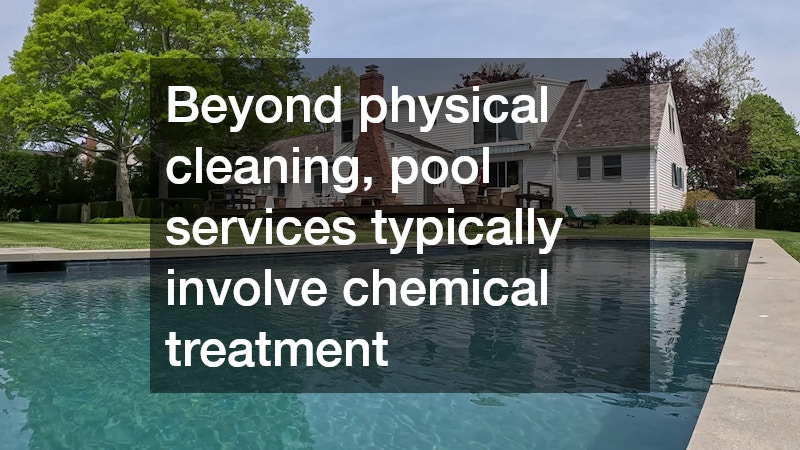Maintaining a clean and safe swimming pool is essential for both pool owners and users, providing a hygienic environment for relaxation and exercise. A professional pool cleaner can play a vital role in achieving this goal, utilizing their expertise and industry knowledge to ensure that your pool remains in pristine condition.
Pool Cleaning Service
Professional pool cleaning services encompass a variety of tasks designed to maintain both the cleanliness and functionality of a pool. Initially, cleaners will conduct a thorough inspection to assess the pool’s current condition and identify any specific areas requiring attention.
This evaluation helps in tailoring their services to the pool’s unique needs, ensuring comprehensive care.
Routine cleaning tasks include surface skimming to remove debris such as leaves and insects, which could affect water quality and filtration systems. Vacuuming the pool floor and walls is also part of the process, eliminating dirt and algae buildup to prevent staining and ensure a pleasant swimming environment. Additionally, cleaners may service the pool’s filtration and circulation systems to ensure optimal performance.
Beyond physical cleaning, pool services typically involve chemical treatment to balance the water chemistry, preventing harmful bacteria growth and ensuring swimmer health. Testing and adjusting chemical levels—such as chlorine, pH, and alkalinity—is an integral part of professional pool cleaning, addressed with precision and care by experts in the field.
Service Frequency
Determining the frequency of professional pool cleaning largely depends on several factors, including pool usage, environmental conditions, and water quality. For pools that experience heavy use or are situated near foliage, more frequent cleaning may be necessary to maintain pristine water conditions. Typically, residential pools benefit from weekly or bi-weekly professional cleaning services.
The surrounding environment also influences cleaning frequency. Pools exposed to high levels of dirt, debris, or pollen might require more regular attention to ensure that these contaminants do not compromise the water quality. Therefore, understanding local environmental conditions can help in planning an effective pool maintenance schedule.
Additionally, seasonal changes can impact cleaning frequency. During the summer months, when pools are used more frequently, owners might opt for increased cleaning services. Conversely, in the off-season, maintenance can be scaled back, focusing on preventing algae growth and ensuring that equipment remains functional and ready for the next peak season.
Chemical Safety
Balancing pool chemicals is a critical aspect of pool maintenance, tasked with ensuring water safety and hygiene. Professional pool cleaners rise to this challenge by conducting regular tests to determine the chemical balance within the pool. Test kits assist in measuring key metrics such as pH, chlorine, and total alkalinity, forming the foundation for any required adjustments.
When managing a pool’s chlorine levels, professionals seek to maintain a balance that is potent enough to eliminate bacteria yet gentle on swimmers. Many cleaners favor a chlorine range of 1 to 3 parts per million, achieved by using stabilizing agents to prolong chlorination effects and minimize frequent dosing.
In adjusting pH levels, professional cleaners strive for the ideal range between 7.2 and 7.8. They utilize acids or bases to restore balance when deviations occur, preventing potential equipment damage or skin irritation for swimmers. This careful chemical monitoring and adjustment underscore the expertise and precision of professional pool cleaning services.
Simple Maintenance Tasks
Pool owners can undertake several simple maintenance tasks between professional visits to maintain their pool’s condition. Regular surface skimming to remove floating debris prevents larger issues and preserves water quality, a straightforward task that requires minimal equipment. Additionally, cleaning the pool skimmer baskets helps to maintain proper water circulation.
Owners might also consider using basic water test kits to monitor chemical levels periodically. While adjustments should typically be made by professionals to avoid improper dosing, understanding the water’s condition enables the scheduling of professional services when necessary, preventing prolonged imbalances.
Finally, ensuring that the pool area remains tidy and free of obstructions contributes to its cleanliness and functionality. Simple efforts like sweeping nearby decks or trimming overhanging foliage reduce debris entering the pool, complementing professional cleaning efforts and preserving the pool’s cleanliness over time.
Professional pool cleaning encompasses a series of intricate processes, combining specialized equipment, chemical management, and expert knowledge to ensure a safe and clean swimming environment. Pool owners can maximize the benefits of professional services by understanding these essential practices and complementing them with their own maintenance tasks. Together, professional attention and owner diligence preserve the quality, safety, and enjoyment of swimming pools.




